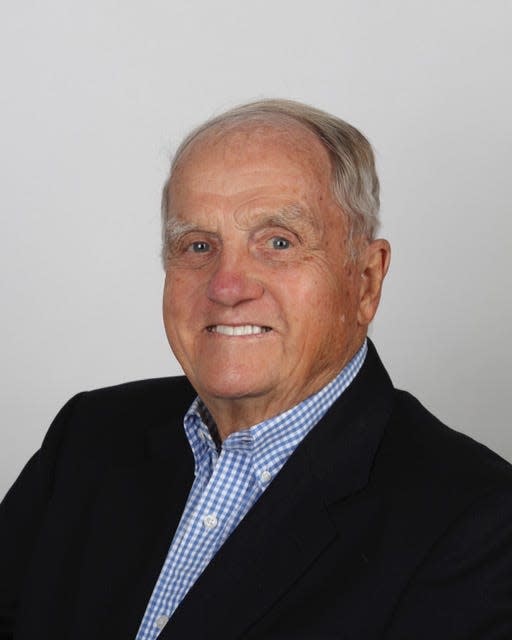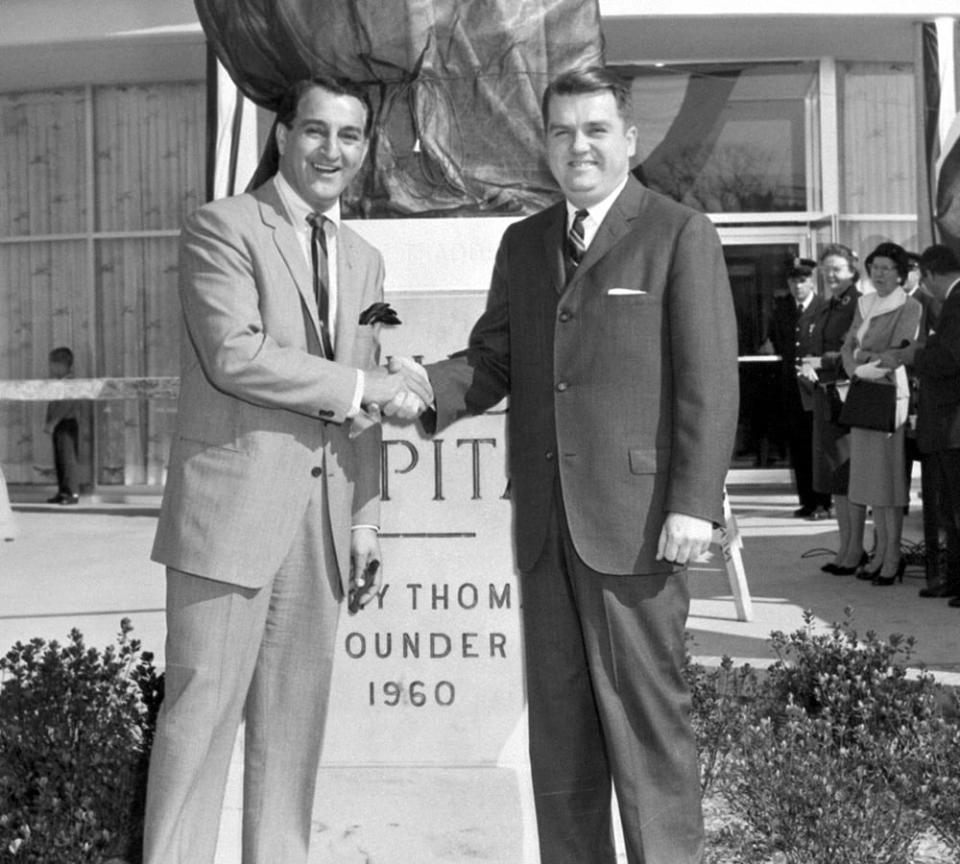Dr. Donald Pinkel, creator of childhood leukemia cure, had South Texas ties
- Oops!Something went wrong.Please try again later.
A memorial service will be held this week for Dr. Donald Pinkel, the “father of pediatric oncology” and first medical director of St. Jude Children’s Cancer Research Hospital, who revolutionized the treatment of cancer in children.
He died on March 9 at the age of 95.
Pinkel had an illustrious career with stints at several of the top hospitals across the nation. His work was punctuated by working at Driscoll Children's Hospital in Corpus Christi in his final medical posting before his retirement as a doctor in the 1990s.

When he was 23, Pinkel served as a pediatrician in the Army Medical Corps, where he contracted polio and had to learn how to walk again.
Pinkel trained under Dr. Sidney Farber, founder of Dana-Farber Cancer Institute in Boston, who believed the same instruments used on adults could be used on children. But Pinkel had a hard time agreeing with that, according to Pinkel’s former colleague Dr. Judith Mullins.
Two years later, Pinkel accepted a job as the first chief of pediatrics at Roswell Park Cancer Institute in his hometown of Buffalo, New York, where he found the freezing winters took a toll on his polio-affected body.
In 1961, Pinkel met with entertainer Danny Thomas, the founder of St. Jude Children’s Research Hospital. Pinkel later served as the first medical director of St. Jude Children’s Cancer Research Hospital in Memphis, Tennessee, from its beginning in 1962 until 1973.

Before Pinkel’s time at St. Jude, it was widely believed that children with leukemia were going to die. By 1968, the Pinkel Team achieved a 50% cure rate in its leukemia treatments.
“His work at St. Jude as the director of course is something that the parents of all the children, particular with leukemia, but with other cancers should be very grateful of," said Dr. Jaime Fergie, director of Pedriatric Infectious Diseases at Driscoll Children's Hospital. "Because when he began his work at St. Jude, childhood leukemia was considered basically a fatal disease."
Fergie, an epidemiologist specialist at the hospital, met Pinkel at the start of his career at Driscoll Children’s Hospital in the 1990s after learning about him during his three years of specialty training at St. Jude.
“There was almost a 100% death rate and he began to think about ways to change that,” Fergie said. “He came up with really innovative ideas that at the time were very controversial, but I know that they did actually transform the prognosis for the cancer diseases, which right now more than 90% of children with leukemia survive.”
Pinkel, along with his colleagues, identified four obstacles to the cure of leukemia: drug resistance, drug toxicity, meningeal relapse and pessimism, according to St. Jude.
His treatment plan, involving drugs, radiation, and the introduction of medicine directly into the spinal fluid, is still used today.
Among Pinkel’s many awards include some regarded as the highest honors in the medical field. He was awarded the Albert Lasker Award for Clinical Medical Research, the Charles F. Kettering Prize for Cancer Research and the Pollin Prize for Pediatric Research.
He was presented with the American Cancer Society Award for Clinical Research and the Leukemia and Lymphoma Society of America granted him its “Return of the Child” award.
He also received the Zimmerman Prize for Cancer Research in Germany and the the Royal College of Pediatrics and Child Health biennial Windermere Lectureship in the United Kingdom.
In 2017, St. Jude dedicated the “Donald P. Pinkel, MD, Research Tower” in his honor.
“He was a very humble individual, who never really highlighted to anybody all of his accomplishments,” Fergie said. “He was just happy with what he was doing. He was, obviously, a smart individual who was very often willing to give advice to younger physicians and also to give encouragement to people on their careers. I certainly did benefit from his advice.”
How he left a legacy in Corpus Christi
Mullins first met Pinkel over the phone while he was working at the MD Anderson Cancer Center in Houston. As the sole oncologist at Driscoll Children’s Hospital in Corpus Christi, Mullins referred her patients to MD Anderson for more than five years before he left around 1990.
“He decided he’d like to come to Corpus Christi,” Mullins said. “He had a sailboat and he wanted to be near the coast.”
His wife, Cathryn Howarth Pinkel, worked at Driscoll as a pediatric hematologist-oncologist, after her son, Michael, was finally old enough for school. The Pinkels purchased a condominium on Corpus Christi’s iconic Ocean Drive and moved their sailboat from Galveston Bay.
Together, they worked as oncologists at Driscoll before he retired.
His former colleagues remarked that the good weather and the proximity to the sea were likely the biggest reasons that Pinkel enjoyed working in Corpus Christi.
Though known for his work with children, Pinkel was also quite the father. He had ten children, nine with his first wife and one with his second.
Mullins recalled the stories he’d tell of taking his first nine kids to the beach in Destin, Florida.
“Everyone was surprised one father could handle nine children by the beach,” Mullins laughed. “He never seemed to think any challenge was too great.”
The Pinkels settled into their life in Corpus Christi, changing the way local children received treatment.
With Pinkel's arrival came the opportunity for a membership in the national organization for cancer research in children, the Children’s Oncology Group.
“He really helped our program at Driscoll," Mullins said. “After he came, we were eligible for a full membership. It helped me keep up with education and our program because we didn’t have to send patients to Houston. We could do everything at Driscoll.”
He encouraged the hospital to do outreach clinics in the Valley, a seemingly impossible feat for such a small staff but one that continued even after Pinkel’s time at Driscoll’s Children Hospital concluded.
Like many with polio, some of Pinkel's symptoms returned later in life and he often had difficulty walking. Eventually, he relied on a cane to get around.
Pinkel and his family left Corpus Christi in 2001. He spent the rest of his life in San Luis Obispo, California.
In his later years, he served on the faculties of California Polytechnic State University and the University of Southern California, working well into his 80’s.
He is survived by his second wife, Cathryn; his daughters, Rebecca Amthor, Nancy Pinkel, Mary Pinkel, Noelle Greene, Sara Pinkel and Ruth Pinkel; his sons, Michael and Thomas; 16 grandchildren; and five great-grandchildren.
A memorial service for Pinkel's life will be held on Friday at the Reis Funeral Home in San Luis Obispo, California.
This article originally appeared on Corpus Christi Caller Times: Dr. Donald Pinkel, creator of childhood leukemia cure, dies at 95

